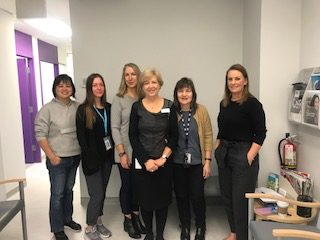- 2019
|
- Runner-Up
|
- Living with Illness or Disability

This award was formally named “Living with Illness”. Our Excellence in Quality category names changed in 2020 to reflect the updates to our BC Health Quality Matrix. Visit our Categories and Criteria page to find out more.
BC Cancer’s Adult Childhood Cancer Survivors (ACCS) program is the first of its kind in the province, offering a necessary service for a population that is often underserved. This program provides lifelong follow-up care for approximately 3,000 adults who survived cancer as children. Before 2016, no services of this kind existed in BC.
This follow-up care is necessary for childhood cancer survivors in BC to live into their later years. Studies have shown that adults who were treated as children for cancer face an 80% chance of significant health complications and health risks, known as “late effects.” For example, they may be more likely to experience major health problems such as a second occurrence of cancer, cardiovascular disease, and psychosocial issues depending on their childhood cancer diagnosis and treatment. These survivors must receive the appropriate screening for and management of these risks, as well as psychosocial support. However, many individuals treated for cancer years ago do not even know they face these risks to begin with, as the effects may not appear until up to 20 years later.
To serve this vulnerable population, ACCS staff knew they had to have a model that could accommodate those with the highest needs first. A task group looked at research specific to patients in BC as well as other provinces’ and countries’ best practices, and then developed a multi-tiered service delivery model, resulting in the opening of the BC Cancer Late Effects, Assessment and Follow-up (LEAF) Clinic.
Each survivor who is a part of the program receives individualized care based on their past cancer diagnosis and treatment. They meet with a radiation oncologist or nurse practitioner to review their medical history, risks of late effects, and recommended screening. LEAF Clinic Counsellors use trauma-informed care, cognitive behavioural therapy and other evidence-based practices to help patients achieve their goals. This is paired with excellent patient communication tools to ensure all health care providers involved are well-informed of patients’ care needs.
The highest-needs patients are treated at the LEAF Clinic, while staff share their knowledge with primary care providers and oncologists outside Vancouver so that they can work with low-risk patients to monitor and manage late effects. Since opening in 2016, the Clinic has had a total of 1,126 medical visits for individuals at high risk for developing health problems related to a past cancer diagnosis and treatment. They have done 2,023 consultations with other health care providers, community resources and social programs on behalf of their patients, expanding their knowledge past the clinic doors. The ACCS program is providing childhood cancer survivors the care they need to live with their illness, wherever they are.

